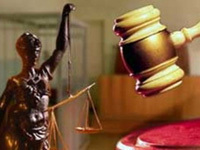Ward Churchill: The lie lives on
 Make no mistake about it: America's so-called legal "system" is hopelessly and intransigently corrupt.
Make no mistake about it: America's so-called legal "system" is hopelessly and intransigently corrupt.
In fact, if this "system" were beholden to its own laws, it would undoubtedly be guilty of fraud, extortion, obstruction of justice and conspiracy.
Of course, this reality should be self-evident, considering that men like Clarence Thomas, Antonin Scalia, Samuel Alito, John Roberts and Anthony Kennedy preside at its summit-the United States Supreme Court.
These five so-called "justices" are paradigms of legal realism-the judicial philosophy now infecting American jurisprudence. Legal realism contends that there is no such thing as law, only the whims of judges who make decisions based upon their own biases, political agendas and/or economic interests and then label them "law."
Legal realism is why these despicable "justices" have demonstrated no compunction about reversing decades of racial progress, ignoring legal precedent, and making individual rights and freedoms subordinate to corporate rights and freedoms.
But if the self-serving legal "opinions" of these five men are not enough to expose the legal "system's" corruption, there is always the disingenuous adage that "nobody is above the law."
Police officers who use excessive force, commit perjury, or fabricate evidence to obtain fraudulent convictions are rarely prosecuted, and if they are, they are usually acquitted. Even in the rare case of a conviction, such officers are usually given a proverbial "slap on the wrist" as punishment.
In addition, prosecutors who have intentionally withheld exculpatory evidence, suborned perjury, utilized "junk science," exploited racism, or engaged in similar misconduct to obtain guilty verdicts are frequently rewarded with judgeships or lucrative private law practices, and, in some cases, have even been reelected as prosecutors after their misconduct was revealed.
Meanwhile, the wrongfully accused and/or convicted often receive little or nothing in compensation for the injury to their reputations, the expenses incurred defending themselves, or the years of wrongful imprisonment they've suffered.
In South Bend, Indiana, for example, a federal magistrate denied any compensation to Richard Alexander, an African-American man who spent over five years in prison for crimes he did not commit. In speciously rationalizing this denial, this magistrate contended that Alexander failed to prove that he had been prosecuted in "bad faith."
In other words, to obtain compensation for an injustice, a wrongfully convicted person has to become a mind reader capable of discerning the intentions and motivations of the very people who investigated, prosecuted and imprisoned him.
Not surprisingly, the chief prosecuting attorney at the time Alexander was convicted subsequently became an appeals court judge, and the deputy prosecutor who actually tried Alexander was appointed to a judgeship in superior court.
This corruption of the legal "system" even occurs at the highest echelons of the federal government, which means that the federal agencies responsible for investigating abuses and corruption at the state and local levels may actually be more abusive and corrupt than the people they are investigating.
FBI agents who violate the rights of targeted individuals are routinely insulated from criminal charges by so-called "immunity" doctrines. Even on those rare occasions when agents are prosecuted and convicted, they are usually pardoned, as then-president Ronald Reagan demonstrated in the early 1980s. Yet the people whose rights they've violated often languish in prison for decades, and some still remain there to this day.
Nothing, however, invalidates the "nobody is above the law," adage more completely than the legal "system's" conspicuous disregard of the crimes committed during George W. Bush's illegal occupancy of the White House.
Lawsuits against former Attorney General John Ashcroft for abusing the "material witness" statute after the September 11, 2001 attacks have been routinely dismissed, and even the case that has worked its way up to the Supreme Court-Ashcroft v. al-Kidd-has seen the Obama administration, which rode into the White House on the promises of "hope" and "change," zealously defending Ashcroft's abuses.
In addition, allegations of wrongdoing against Ashcroft's successor, Alberto Gonzales, for the politically motivated firing of nine federal prosecutors resulted in no charges being brought, and advocates of torture, like former Justice Department attorneys John Yoo and Jay Bybee, were simply scolded for using "bad judgment."
Funny how the same legal defenses the United States government would reject and ridicule if invoked by foreign war criminals suddenly become acceptable when advocated by its own war criminals.
And, speaking of war criminals, George W. Bush, Dick Cheney, Karl Rove, Donald Rumsfeld and others of their ilk now have lucrative careers writing books, giving speeches and appearing on talk shows.
Finally, as if to top off this mélange of injustice and hypocrisy, it was recently announced by assistant United States attorney John Durham (not surprisingly, a Bush administration appointee) that former CIA official Jose Rodriguez Jr. would not face criminal charges for destroying tapes that purportedly showed CIA agents torturing detainees.
Of course, if the average citizen destroyed such evidence, prosecutors would indict him or her in a heartbeat for "obstruction of justice." But since CIA agents are routinely allowed to engage in rape, torture, murder, and the destruction of democracies to preserve corporate resources and profits, obstruction of justice is apparently "small potatoes."
Also, just as in Richard Alexander's case, the ones profiting from the Bush dictatorship's criminality are the same ones who participated in it: Gonzales is now a professor at Texas Tech University; Yoo is a law professor at the University of California, Berkeley; and Bybee is a federal appeals court judge.
From these examples it is clear that, no matter who is in power, America's legal "system" will go to extraordinary lengths to punish people, even innocent people, who fall out of favor, and will go to even greater lengths to protect and defend those whose corruption serves the "system."
In response to my previous Pravda.Ru articles critiquing America's legal "system," some critics argued that, despite its flaws, American "justice" is superior to the "justice" dispensed by more repressive countries. Although I do not dispute this, what these critics fail to realize is that no system should be lauded simply for rising above the lowest common denominator, but should instead be judged by how far it has deviated from its professed ideals.
Sometimes a case comes along that helps to gauge the extent of this deviation. Ward Churchill v. University of Colorado, et al. is currently such a case.
Ward Churchill was a tenured professor at the University of Colorado (UC). Shortly after the 9/11 attacks, he authored an essay in which he referred to some of the 9/11 victims as "little Eichmanns," a reference to Nazi leader Adolf Eichmann. Although his essay was largely ignored at first, in 2005 its contents became more widely circulated, prompting many right-wing pundits and politicians to demand that Churchill be fired.
In addition to this right-wing frenzy, Churchill had the misfortune of being considered a "leftist" academic during the new McCarthyism-a time (that persists to this day) when organized efforts were undertaken to purge universities of professors considered to be "liberal" or "leftist," and when school boards, like the Texas Board of Education, were rewriting textbooks to appease whites, Christians and conservatives, primarily by disparaging the accomplishments of minorities, discounting the separation of church and state, and even censoring the writings of historical icons like Thomas Jefferson.
Even though Churchill's essay was protected by the freedom of speech provisions of the First Amendment, UC convened an "investigative committee" that subsequently accused him of "plagiarism" and other forms of academic misconduct. After being fired as a result of these allegations, Churchill sued the university and won. Although jurors only awarded him a single dollar, they made clear their belief that the misconduct allegations had simply been a pretext used to fire Churchill for the expression of his political views. The ultimate remedy for Churchill's unjust dismissal was left in the hands of the presiding trial judge, Larry Naves.
Although I applauded the jury's verdict, I did so with trepidation, stating in my article A Tale of Two Academics, (Pravda.Ru, June 18, 2009) that, "anyone familiar with American jurisprudence knows that such victories are fleeting in a legal system that labors harder to rationalize injustice than it does to produce justice."
While I would like to say that those words emanated from my "gift of prophecy," the reality is I was familiar enough with the machinations of the legal system to know that it would do anything to deny justice to a controversial figure like Ward Churchill. So when Churchill returned to court, it was not surprising to see the ethically corrupt Naves disregard the jury verdict and issue a ruling in favor of UC and the other defendants, claiming they enjoyed "quasi-judicial immunity" from lawsuits.
And just a few days ago, in keeping with the judicial traditions of hypocrisy and the rationalization of injustice, a Colorado appeals court speciously endorsed Naves' ruling, thereby ensuring the destruction of academic freedom throughout the United States.
Yet, given the impact that Churchill's case has not only on academic freedom, but upon freedom of speech in general, it would seem that many, if not most, Americans would be outraged by the duplicity of Colorado's so-called "legal system."
The problem Churchill faces, however, is the same one once faced by adult magazine publisher Larry Flynt in the case of Hustler Magazine, Inc. v. Falwell-nobody wants to defend an unpopular speaker, because, by doing so, they are often accused of also endorsing what that speaker said.
But what Churchill said in his essay is irrelevant. The reason for the "freedom of speech" clause in the First Amendment-perhaps the sole reason-is to protect unpopular speech. Popular speech, after all, is protected by virtue of its popularity. Yet American history is replete with examples of how speech unpopular during one era subsequently became popular during another. If legal protections for such speech did not exist, however, many of those people who held "unpopular" opinions might never have been allowed to express them.
Naturally some have claimed that it is hypocritical to condemn the firing of Churchill while, at the same time, supporting demands that Gonzales and Yoo be fired from their respective academic positions-a stance I took in previous Pravda.Ru articles. But there is a significant distinction among these cases: Churchill was fired for exercising his right to freedom of speech. Gonzales and Yoo, on the other hand, corruptly sought to destroy this right, along with several others. And, unlike Churchill, they actually held positions of governmental power that gave them the capacity to facilitate this destruction. They should not be rewarded for this corruption by deriving income from teaching about the very rights and freedoms they've demonstrated nothing but contempt for.
In addition, such accusations of hypocrisy were recently muted by the right-wing's "outrage" over the recent firing of Juan Williams from National Public Radio (NPR). Many of the same right-wing pundits who clamored for Churchill's dismissal were suddenly condemning the firing of Williams as an affront to "freedom of speech," with some, like the chairman of Fox (Faux) News, even comparing it to Nazism.
Another argument leveled against Churchill is that nobody is entitled to a job. While this may be true in "at-will" employment situations, Ward Churchill had academic tenure, and tenure was, and is, designed so that professors will be encouraged to write, speak or engage in controversial studies without fear of economic retaliation. For example, if not for the protections of tenure and/or respect for academic freedom, Alfred Kinsey would probably have been unable to conduct his groundbreaking research into human sexuality.
Another argument often proffered to justify Churchill's dismissal is that he was fired for plagiarism and academic misconduct, not for the contents of his essay. But this argument completely ignores the jury's verdict, something Naves and the Colorado court of appeals seemed more than willing to do. Unfortunately, this is not an uncommon practice in the realm of legal realism. Judges who seek to promote their own agendas or protect their political cronies rarely let little "nuisances" like facts, truth, and justice stand in their way.
Finally, some Churchill critics have defended Naves' "quasi-judicial immunity" ruling. But for Naves to belatedly invoke it, and for an appeals court to embrace it, after a full jury trial was conducted not only is repugnant to judicial economy, it is an unadulterated fraud. After all, if Naves sincerely believed such immunity existed, Churchill's case should never have gone to trial in the first place.
Which leads to this simple conclusion: Naves did not expect Churchill to win. Undoubtedly he believed that the animosity the right-wing had generated against Churchill, coupled with UC's misconduct allegations and his biased trial rulings, would turn a jury against Churchill. When that did not happen, he concocted the "quasi-judicial immunity" defense.
The positive to Ward Churchill's case is that it serves to expose the duplicity and double standards of America's legal "system," as well as the mendacity and amorality of the people who control it. The negative is that most Americans rarely, if ever, interact with this "system" and therefore have no incentive to change it.
As the examples in this article illustrate, however, America's legal "system" has abdicated its responsibility to serve as a "check-and-balance" against the other two branches of government, and has instead been transformed into a weapon exploited by the wealthy, the corporations, and the politically connected to defend their criminality, conceal their corruption and promote their economic interests.
Dr. Martin Luther King Jr. once said, "No lie can live forever." America's legal "system," however, has proven, time and again, that the lies it propagates do indeed live forever.
Will Ward Churchill's case be one of them?
David R. Hoffman
Legal Editor of Pravda.Ru
Subscribe to Pravda.Ru Telegram channel, Facebook, RSS!




